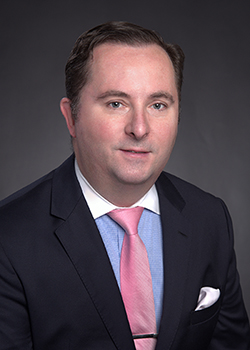
Ronan Kelly, MD, MBA, the study's
lead author and Baylor Scott & White
North Texas chief of oncology,
Charles A. Sammons Cancer Center.
Watch and download an interview with
Dr. Kelly, an interview with a patient
enrolled in the clinical trial, and
broadcast quality b-roll under the
VIDEOS tab.
DALLAS, Texas – The results of a study published today in The New England Journal of Medicine found that the immunotherapy drug nivolumab (Opdivo®), if used following neoadjuvant chemoradiation therapy and surgical resection for early-stage esophageal or gastroesophageal junction cancers, can significantly prolong disease-free survival and reduce risk of disease recurrence.
The global phase III clinical trial was a first of its kind in this disease setting, randomizing 794 patients from 29 different countries at 170 sites including at Baylor University Medical Center in Dallas. Ronan Kelly, MD, MBA, the system’s Dallas-Fort Worth chief of oncology and director of oncology at Baylor Scott & White Charles A. Sammons Cancer Center and the W.W. Caruth Jr. Chair of Immunology at Baylor University Medical Center in Dallas, was the lead author of the recently released NEJM article.
The landmark findings of the CheckMate-577 study, sponsored by Bristol Myers Squibb, represent a major research advancement in the treatment of esophageal (E) and gastroesophageal junction (GEJ) cancers utilizing the PD-1 inhibitor nivolumab as a novel, adjuvant treatment for operable stage II or stage III cancers following neoadjuvant chemoradiation therapy and surgical resection. Among patients with resected esophageal or gastroesophageal junction cancer who had received neoadjuvant chemoradiotherapy, median disease-free survival was significantly longer — more than double (22.4 months vs. 11.0 months, HR 0.69, p<0.001) — among those who received nivolumab (Opdivo®) adjuvant therapy compared to those who received placebo.
"The war on cancer is continuing while we fight the COVID-19 pandemic. For the first time ever, we now have a therapeutic option in the post-operative setting to improve disease-free survival for these patients," said Dr. Kelly, who served as the study principal investigator for the last five years.
Despite years of research, this is the first time an immunotherapy drug has been shown to improve disease-free survival among patients with early-stage E/GEJ cancers. The drug — nivolumab (Opdivo®), which has been used as a treatment option in multiple forms of cancer including metastatic melanoma, renal cell carcinoma and non-small cell lung cancer — targets the PD-1 pathway.
"Approximately one-third of patients with esophageal or gastroesophageal junction cancer who undergo neoadjuvant chemoradiation therapy followed by tumor resection will have disease recurrence and this risk is even higher among the 70% to 75% of patients who do not have a pathological complete response," said Dr. Kelly. "This novel treatment is the first of its kind to harness the body's own immune system to fight early-stage E/GEJ cancers more effectively, providing patients a chance to prevent disease recurrence."
Advancement Leads to Potential New Standard of Care
This breakthrough comes at a time when esophageal and gastric cancers, combined, are the second leading cause of cancer deaths worldwide. The American Cancer Society estimates that in the United States there will be 19,260 new esophageal cancer and 26,560 stomach cancer cases diagnosed this year.
The results of this study have led the therapy to become a potential new standard of care for esophageal and gastroesophageal cancers, which are notoriously difficult to treat and have seen limited advances over the last few decades.
In an accompanying editorial in the recent issue of The New England Journal of Medicine, Dr. David H. Ilson, Memorial Sloan Kettering Cancer Center, writes that “CheckMate -577 is a practice-changing trial…” Adding, “Improvement in survival among patients with esophageal cancer has been long awaited in those undergoing the arduous journey of chemotherapy, radiation, and surgery. The CheckMate-577 trial provides a welcome new therapeutic option for these patients.”
Adjuvant use of nivolumab (Opdivo®) in EC/GEJC following neoadjuvant chemoradiation therapy and surgical resection with residual pathologic disease was incorporated into the National Comprehensive Cancer Network (NCCN) practice guidelines in December 2020 and was given category 1 evidence by the expert panel.
Opdivo® is a registered trademark of Bristol Myers Squibb.
A Leader in Cancer Clinical Trials
This clinical trial is one of many innovative trials at Baylor University Medical Center, offering patients access to potentially exciting treatment options, many of which are looking to turn on a patient's own cancer fighting cells, their immune cells, to wage a microscopic war between their immune system and their tumor cells. There are more than 100+ active clinical trials enrolling patients with cancer throughout the health system.
Baylor University Medical Center, a part of Baylor Scott & White Health, is accredited by the Foundation for the Accreditation of Cellular Therapy (FACT), working to define the next generation of immunotherapeutic research and clinical care.
###
About Baylor Scott & White Health
As the largest not-for-profit health system in the state of Texas, Baylor Scott & White is empowering customers to live well by reimagining traditional healthcare — creating more convenient, personalized and informed experiences. It serves more than three million customers through 53 hospitals, including flagship academic medical centers in Dallas, Fort Worth and Temple; the Baylor Scott & White Research Institute; 1,300+ access points; 59,000+ team members; and its leading digital platform — MyBSWHealth. The system's award-winning employer solutions include Baylor Scott & White Health Plan, Baylor Scott & White Quality Alliance and Levanto — a company offering digitally enabled health products. Founded as a Christian ministry of healing more than a century ago, Baylor Scott & White's mission is to promote the health and well-being of all individuals, families and communities. For more information, visit: BSWHealth.com

